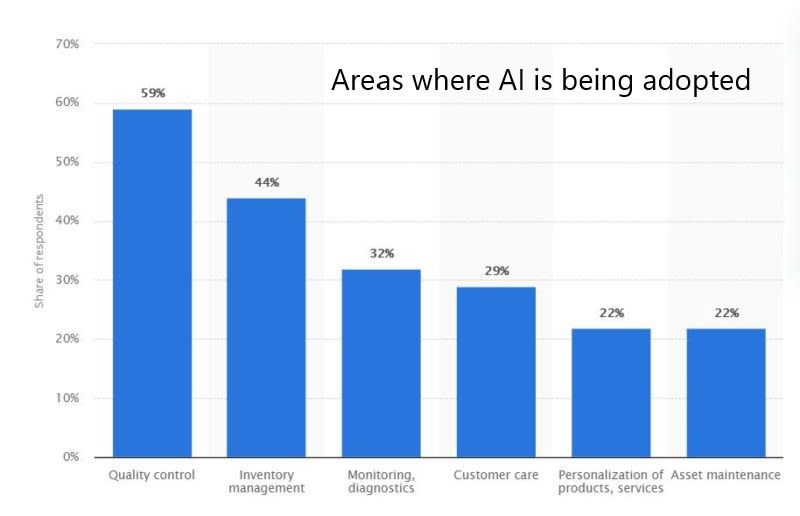AI inventory management: 7 ways artificial intelligence can enhance inventory management
Once a sci-fi movie staple and now a reality, artificial intelligence has finally entered the business world.
Thirty years ago, imagining artificial intelligence systems performing human-like tasks, possessing reasoning and cognition, solving problems, organizing data, and self-learning would’ve seemed impossible. However, with a digital transformation taking place within many companies, things are beginning to change.
The applications of AI are far-reaching and include self-driving cars, search suggestions, facial recognition, and behavior prediction.
One industry benefiting hugely from artificial intelligence is the warehouse and logistics sector. Chiefly, artificial intelligence inventory management software can automate and streamline inventory management processes to provide real-time updates and solutions.
Also, with AI becoming affordable and accessible to small and big businesses alike, there’s never been a better time to reap the benefits of integration.
Gone are the days of chasing staff for updates using pen and paper. AI enhances inventory management so you can redistribute resources and focus on other key business areas.
This article will look at seven ways artificial intelligence can enhance inventory management.
What is inventory management?
In short, inventory management is the process of controlling inventory in a business. This covers the buying, manufacturing, storing, and consuming of items. Items are tracked from the beginning of their journey to your warehouse and beyond.
Inventory management software helps regulate this process, allowing you to monitor and track inventory levels, orders, sales, deliveries, and receiving. Inventory management tools can also create purchase orders, bills of materials, and other production-related documents.
Fortunately, several of these tools are available online, and they’re often cloud-based and offered by subscription. What’s more, they now come integrated with artificial intelligence.

Source: AIMultiple
The above graph indicates inventory management as one of the top business areas for implementing AI.
Automated inventory management software has vastly improved businesses by creating data-driven manufacturing and distribution centers. AI’s capacity to understand real-time inventory control dynamics, which affect inventory stock levels, makes it revolutionary compared to traditional human methods. In particular, AI can predict scenarios, recommend solutions, and even perform them for you.
Artificial intelligence inventory management isn’t here to take over human roles just yet, though, so make sure you have staff to check in on your automated processes and have the final say on stock management decisions.
Below are seven ways artificial intelligence can enhance inventory management in your business.
7 ways AI can enhance inventory management
1 . Effortless demand forecasting
Traditional demand forecasting methods, such as autoregressive integrated moving averages and exponential smoothing, are becoming antiquated because businesses now generate much more data. But AI-enhanced inventory management systems can spot demand patterns and use this data for accurate forecasts and optimizing warehouse replenishment plans.
Artificial intelligence inventory management enables enhanced and instant forecasts based on real-time data. This can be collected from internal and external sources, such as demographics, weather, online feedback and reviews, and social media.
Tapping into external data and machine learning, businesses that integrate AI into their inventory systems can leave competitors still entirely dependent on human analysts and manual forecasting behind.
Demand forecasting with AI sharply cuts down supply chain mistakes. What's more, this boost in precision directly curbs lost sales stemming from errors like incorrect stock counts and misjudged consumer demand. Using the power of AI algorithms and real-time data, demand forecasting will not only have improved accuracy but will also see a boost in productivity.
2 . Improved productivity through AI algorithms

You wouldn't want your accountant to use pencil and paper for your profit and loss statement. On the contrary, you would want them to use sophisticated accounting software capable of detecting errors and suggesting opportunities for expense reduction and revenue enhancement. In the same way, your efficiency and productivity will greatly increase.
In terms of machine learning inventory management, algorithms come with a bevy of benefits, including monitoring and optimization of:
- Quantities.
- Cycle times.
- Lead times.
- Temperatures.
- Errors.
- Downtime planning.
While you and your team could diligently oversee tasks, integrating artificial intelligence for detection, tracking, and optimization liberates your time for other pursuits. Think of AI as your guide to improve your productivity by allowing you to focus on strategic planning, creative problem-solving, and building client relationships.
3 . Better customer support using chatbots
The rise of the chatbot is upon us, with the chatbot market predicted to reach $21.08 billion by 2028, and artificial intelligence inventory management is no exception.
AI chatbots help you stay updated on your ERP inventory system and track orders and other updates. For example, you could ask a chatbot for the lowdown regarding a specific order. This makes it easier for staff to carry out their tasks, too.
Additionally, chatbots bring top-level customer service that goes beyond instant messaging. For example, DHL now offers a service where you can ask a smart device like Amazon’s Alexa for instant updates on your parcel’s location and estimated delivery time.
This type of voice-assisted chatbot is becoming ever more popular. In fact, Statista predicts that by 2026, there will be over 157 million voice assistant users in the United States alone.
The level of customer support afforded by AI improves the customer experience by giving instant answers and is likely to increase retention and satisfaction rates.
Some other ways chatbots can aid your inventory management include:
- Quickly assisting with delivery requests, processing orders, and issuing billing and receipts.
- Improving customer service by tracking items, solving customer queries, and allowing them to ask further questions.
- Allowing your business to collect feedback from customers and suppliers.
- Handling routine requests, freeing up your live chat technicians to focus on complex customer requests,
- Providing 24/7 support, assuring that your customers have their urgent requests responded to promptly, even outside of regular business hours and during times of insufficient staffing.
4 . Wiser warehouse management

AI inventory management makes warehouse management easier, more efficient, and more focused. Streamlining and optimizing warehouse management processes lessens the chance of human error while freeing up staff to be deployed elsewhere.
Some of the ways AI can improve warehouse management include:
- Better communication: Automated AI systems can communicate accurate information quicker than human operatives. Implementing cloud-based devices allows for instant and on-the-go updates.
- Logistics: Optimizing logistics tasks such as counting pallets or designating the required equipment for staff can now be done by AI, reducing processing time and human error.
- Inventory optimization: Using AI frees up resources and budgets usually spent on inventory control.
- Automating wages and performance updates: Using AI lets you automate wages and schedule performance updates. Also, these could be linked to data to give better insights into employee performance.
- Employee training: AI-driven tools can analyze employee performance and suggest personalized training.
- Predictive maintenance: AI can predict when equipment will require maintenance, preventing unscheduled downtimes.
All of these warehouse management improvements combine to give you a competitive advantage.
5 . Minimized downtime through the help of predictive analytics

Predictive analytics has become a useful tool for decision-makers, allowing them to make data-driven decisions with greater insights.
This cost-effective solution utilizes predictive algorithms to allow you to detect anomalies and failure patterns, learn from them, and predict future failing issues. The result is lower downtime, as predicted problems can be prevented before they occur.
For example, your AI might log that it takes six months until components within the conveyor belts need replacing. A decision can then be made to change the components every five months to avoid downtime. Or perhaps you’ve recently had network issues across your IT infrastructure. Predictive analytics can help you prevent future server downtime.
6. Automated material procurement
Procurement is an essential part of any manufacturing business that needs supplies and equipment. This process often involves managing a large number of documents, suppliers, and more. With this in mind, it’s clear to see how inefficiencies and mistakes can creep in.
AI analytics can automate such warehouse processes from the first stage of quoting right through to the supply chain. Significantly, according to McKinsey, companies that have introduced AI into their business have reported a reduction in logistics costs of 15% and an improvement in inventory and service levels of 35% and 65%, respectively.
Examples of automated procurement include:
- Procurement spend classification.
- Vendor matching.
- Collecting market and supplier data.
- Detecting anomalies.
7. More lucrative marketing strategies
A considerable benefit of AI-enhanced inventory management is the way it offers better insights that can lead to more lucrative marketing strategies.
In particular, AI and machine learning can highlight the short-lived demand for products and their market. Not only that but with smart inventory tools such as machine learning-based anomaly detection and AI that can spot sporadic changes in product interest, you can achieve an enriched database of likely prospects. This allows you to tailor and personalize marketing strategies to your ideal customer.
Using AI in this way enables you to keep up with current trends as well as keep tabs on what products and services are losing popularity. With marketing strategies informed by data science, you can focus on ensuring increased revenue for your efforts.
Cons of Using AI Inventory Management
Although using AI to enhance your inventory management has many advantages, there are some potential drawbacks you should consider:
- Data dependency: AI relies on data to make decisions. Incomplete or, worse, inaccurate data will tend to yield decisions of a lower quality.
- Initial cost and complexity: Even the most cost-effective AI-powered SaaS (Software-as-a-Service) providers will face (potentially expensive) integration challenges, which will require downtime for training and an initial decrease in productivity as staff learn to use the new system
- Data security and privacy: For your AI system to function correctly and efficiently, data collection will be required. Measures must be taken to prevent theft or misuse. With this in mind, implementing robust data security protocols and adhering to various data privacy regulations will require additional cost and oversight.
- Job displacement and evolution: Adopting RFID tracking (radio frequency identification) powered by AI inventory management will likely reduce the need for roles traditionally focused on manual inventory counting. Supervision of the technological systems that will replace such manual tasks is something the displaced workers can transition to. Retraining and upskilling staff to handle the new technology can be a beneficial approach, fostering a more adaptable and skilled workforce.
Industries that can most benefit from AI inventory management
Any industry that benefits from robust inventory management will benefit from AI inventory management. Here are a few industries that may benefit the most:
- Retail and eCommerce: Demand forecasting and inventory management are already built into many modern-day eCommerce systems.
- Healthcare: AI inventory management can help forecast needed items and supplies and reduce waste.
- Manufacturing: AI can optimize supply chain management and increase efficiency with predictive analytics
- Automotive: JIT (just-in-time) inventory management can now be further streamlined, distribution can be better optimized, and marketplace demand can be better forecasted using machine learning inventory management.
Artificial intelligence inventory management: The key takeaways
Hopefully, this guide on seven ways artificial intelligence (AI) can enhance inventory management has given you some insight into the future of AI in inventory and how it can help your business.
Using automated inventory management can aid in both physical tasks, such as the relocating and tracking of items, to more complex tasks where data and advanced insights are required for error-free planning and demand forecasts. Additionally, it saves on costs and staffing and can bring added security by monitoring systems to notify you of any potential ransomware or cyber-attacks.
As businesses grow, AI-powered methods will become necessary to improve inventory and secure long-term growth. Along with a powerful cloud to secure your data and spin up workloads quickly, using AI will be essential to the success of your business. Get ahead of the game now by deploying artificial intelligence inventory management today.
Related Resources

Luke Cavanagh
Product Operations Manager at Liquid Web. Devoted husband and Tween wrangler. Synthwave enthusiast. Jerry Goldsmith fan. Doctor Who fan and related gubbins.
Keep up to date with the latest Hosting news.



